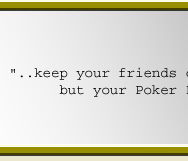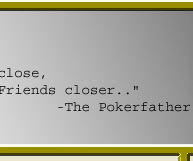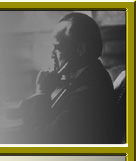(Click Here for the Latest Online Poker News Stories)
Copyright 2004 The Daily Princetonian
via U-Wire
University Wire
September 20, 2004 Monday
HEADLINE: Princeton student develops, markets
poker odds calculator
BYLINE: By Josh Brodie, The Daily Princetonian;
SOURCE: Princeton U.
BODY:
Sitting at a virtual table in an online
poker room just before midnight, a player -- who asked not
to be identified, so we'll call him "John" -- found
himself facing off against nine opponents in a $2 limit game of
Texas
Hold 'Em.
After the flop, he had paired his king in the
hole, giving him top pair. But there was a straight draw possible
and a table full of callers, so John had an important decision
to make: Continue and hope that the cowboys would hold up, or
fold a currently powerful hand.
For most players, the decision to stick around
would be intuitive -- a gut reaction to seeing a strong
hand. But, that night, John wasn't letting himself follow
his instincts. Instead, he was listening to the advice of a computer
program called the Mooraculator, a Hold
'Em odds
calculator and strategy
guide written by Princeton University junior Robert Moore.
The program told John to fold, and after complaining that his
number-crunching guide was being too conservative, he folded.
When the final two cards were dealt, it seemed
the program's counsel might not have been so good. John would
have paired his second hole card, a 10, giving him top two pair
on the board. But when the cards were flipped, an opponent showed
a straight, a hand that would have dominated John's two pair.
For Moore, who was watching the hand along
with this reporter, this was a prime example of the kind of situation
in which players have trouble figuring their odds of winning.
A situation in which knowing the actual odds of victory can keep
a novice or a pro out of trouble.
"Playing at a shorthanded table [one without
many players], people get in the mood of thinking a certain hand
is a winning hand," Moore said, noting how John 's instincts
made him want to play the high pair. But, he continued, "at
a big table, people will make high straights and big flushes."
DEVELOPMENT
Moore was not always the poker enthusiast he
is today. In fact, he didn't become interested in the game until
last year, when ESPN began televising the World Series of Poker,
a no-limit Texas Hold 'Em tournament with a first prize that was
then $2.5 million. After that, he began to play in regular games,
and when he found himself without any pressing obligations over
this past summer, he decided to try to write a program that would
help him and others understand their odds as they played.
After a month of programming, and a naming
suggestion from a friend, the Mooraculator was complete. In mid-August,
Moore began to sell the program on his website: www.robertjmoore.com.
As it stands now, the program has two parts.
The first calculates raw odds -- the probability that your cards
will beat any single opponent's cards should you both stick around
to the end of the game. This information is the result of pure
mathematical computation. After each card is revealed, the computer
performs hundreds of thousands of calculations to figure these
odds.
The second part of the program incorporates
information about your position at the table, past betting patterns
and the number of callers at any given point to make a subjective
recommendation based on algorithms Moore developed.
PLAYING THE ODDS
Department Chair Erhan Cinlar was intrigued
by the program.
"It would be really great to have this
program, to have these probabilities [when playing,]" he
said.
Like Moore, Cinlar noted that as more players
sit down at the table, the odds become much harder to figure and
the program much more valuable.
"The number of cases that you have to
evaluate grows like crazy ... that's the problem with combinatorial
thinking," he said. "Your brain gets overloaded."
Indeed, in several hands, the Mooraculator
overruled John's instinct to play a decent hand, instead suggesting
that he fold all but the most dominant starting cards because
there were still lots of people at the table.
As Moore points out, his program is most useful
in games where the odds, rather than betting skill or face-reading,
play the dominant role.
For that reason, he designed the program to
offer advice only for games with a betting limit on each move.
In no-limit games, there is much more strategy
involved with betting, as a weak hand can more easily force out
a strong hand with a large bet.
But in limit
games with many players, for which the Mooraculator was designed,
Moore claims his program is brutally efficient. During testing,
he said, the program earned approximately 10 times the big blind
in profit every hour.
In general, the program's logic creates its
profit by making sure players get out cheaply on hands they are
unlikely to win, and get as much as possible in situations they
are likely to dominate.
As John continued to play, the Mooraculator
behaved much as advertised -- it suffered dozens of small or cost-free
losses and took in a handful of much larger wins. After an hour
of play, John was up $3.
"It's a Mooracle," John joked, only
half sarcastically.
Moore compared his program to Knish, the consistent
and reliable poker pro from the movie "Rounders."
"Knish makes a living," Moore said.
"He's not in the World Series of Poker, he's not the big
guns ... but he's a success in my opinion ... he could take bigger
risks, but at the same time his life doesn't have the ups and
downs."
Instead, like Knish, the program just keeps
"grindin' out that rent," he said.
ALGORITHM POKER
The downside of this consistently low return
is no small dose of boredom.
For John, who had only been using the program
for an hour, and for Moore, who had been testing it for weeks,
there was much less excitement to the game when the machine was
making their decisions for them.
And while some people believe the future of
online poker will devolve into a detached competition between
increasingly sophisticated algorithms, others disagree.
"[T]he great thing about poker is that
statistically sound advice doesn't always win, otherwise, computers
would have already taken over," wrote Marc Van Houwelingen,
author of "Texas Calculatem," a competitor of the Mooraculator.
"In fact," he continued, "if
a player is known to be always following the odds, that player
will surely be stripped of all of his or her chips by the others
at the table rather quickly. The point is that knowing the odds
on your situation, while necessary, is only part of the equation."
That said, the Mooraculator has been a commercial
success, selling 40 copies in less than a month. At $29.95 per
copy, that's more than $1,000 in profit from what began as a way
to pass the time over the summer.
There are several competing programs out there,
and some offer even more complicated features and algorithms,
but most for a much higher price.
ONLINE
POKER
That programs like this one can routinely make
money playing online raises an interesting question: If poker
is a zero-sum game, who is losing all the money the computer-aided
players are winning?
"There's a sucker born every minute,"
Moore said, echoing the sentiments of P.T. Barnum.
He suggested that lots of the players in these
online limit games are new to poker and don't yet have a feel
for the odds.
Gaining experience can be costly, Moore pointed
out. Literally. That, he says, is one of the best reasons for
people to invest in a program like his.
But, as Van Houwelingen said, there is more
to poker than pure odds, and on occasion, the Mooraculator was
muscled out of a hand that it would have won.
While Moore doesn't have plans to make any
updates soon, he does have some features he would like to add,
possibly in the context of using the program as a Junior Paper
topic.
He said he would like to improve the logic
system behind the program to be able to bluff, and respond to
bluffs, more effectively, with the goal of eventually being able
to compete successfully in no-limit rooms.
Currently, Moore has stopped playing poker
online and turned back to the face-to-face games that first sparked
his interest in the game.
Brian Cho, a friend of Moore's who has followed
the program's development from its nascent stages, still prefers
live games to their online counterparts, despite the reliable
way the program seems to grind out profits.
"The reason I play the game is because
I like making my own decisions and seeing where that takes me,"
Cho said. "If you're playing straight from the program it
eliminates all the entertainment of the game ... of course winning
a hand is very good but playing a very exciting hand is more of
the rush than actually winning it."
But some of Moore's client's seem content to
keep on playing the odds, without letting their emotions get in
the way.
"I'm never leaving my computer again,"
one satisfied customer wrote in a testimonial.
(C) 2003 The Daily Princetonian via U-WIRE
(Click Here for the Latest Online Poker News Stories)
|






